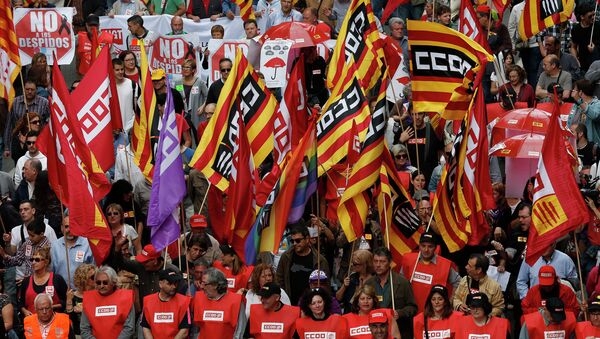According to the country's leading trade unions, which organized the protests, the Madrid demonstration was attended by tens of thousands. The protest was held under the mottp "This is not a way out of the crisis."
The general secretaries of the Workers' Commissions (CCOO) and the General Union of Workers (UGT), two most notable unions in the country, Candido Mendez and Ignacio Fernandez Toxo called on the government for changes from the Puerta del Sol, Madrid's central square.
May day in Madrid pic.twitter.com/51fW5i6JQq
— kwangsik Lee (@kwangsikee) May 1, 2015
Trade unions rejected Spanish Prime Minister Mariano Rajoy's claim that the country has recovered form the crisis arguing that labor and social conditions have not returned to the pre-crisis level.
"We cannot find our way out of the crisis with the austerity policies and poor wages. We radically denounce what is happening and demand changes," Jaime Cedrun, Secretary General of the CCOO in the Community of Madrid told Sputnik.
Union leaders expressed hope that upcoming elections in Spain will lead to the necessary changes in the government's policy.
In May, Spain will hold municipal elections across the country and regional votes in 13 out of 17 autonomous communities. General election is scheduled for the end of the year.
Her counterpart from UGT Ignacio Fernandez Toxo called on the political parties that will participate in the elections to commit to restoring labor rights, increasing wages and creating new jobs.
Left-wing political parties did not miss their chance to take part in the May Day celebrations, as well.
The secretary general of anti-austerity Podemos party, Pablo Iglesias, stressed the importance of Labor Day "at a time when the market totalitarianism threatens democracy."
The leader of the Socialist Party (PSOE), Pedro Sanchez, celebrated the day in Valencia and committed to adopt a new worker's statute in order to fight unemployment.
From 2008 through 2012 Spain experienced a deep recession and the worst unemployment rate in the eurozone.
The European Union's fiscal rules forced the Spanish government to adopt an austerity program in 2012 aimed at slashing the level of its budget deficit to 3 percent by 2016. As a result, the government has cut down public services and social expenditures.
Although Spain's economy began to recover in late 2013, the economic situation in the country is still grave. Spain's unemployment rate rose to 23.78 percent in the first quarter of 2015, up from 23.7 percent in the fourth quarter of 2014, according to the National Statistics Institute.




